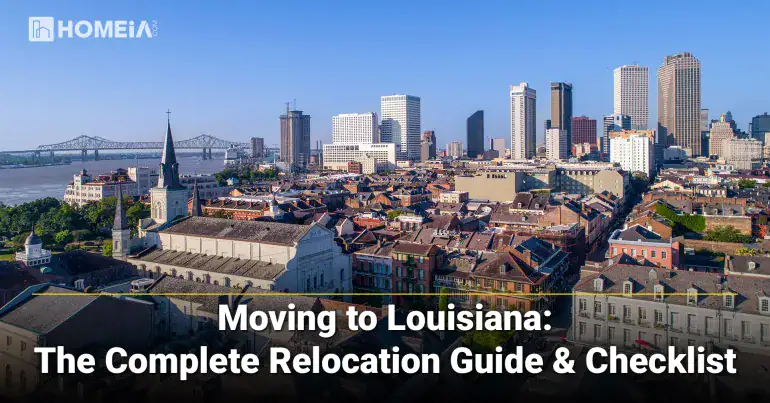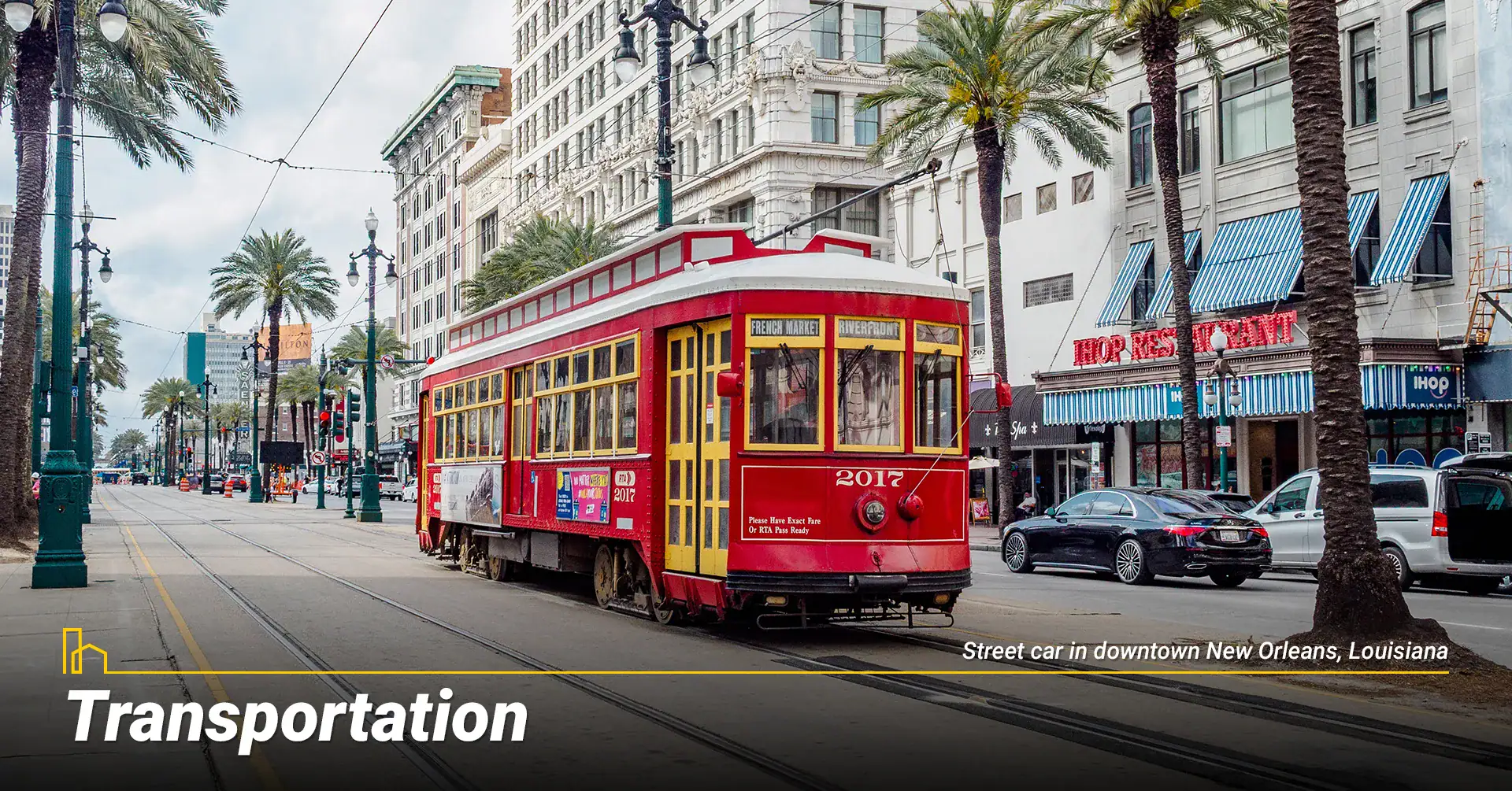Moving to Louisiana: The Complete Relocation Guide & Checklist
- Local Editor:Local Editor: The HOMEiA Team
Published: Oct 10, 2025
- Category: City Living Guide

Bordered by Texas, Arkansas, and Mississippi, and home to vibrant cultural traditions, Louisiana offers a lifestyle defined by rich heritage, culinary excellence, and profound natural beauty. More than 4.5 million residents call The Pelican State home, drawn by its unique blend of French, Spanish, African, and Caribbean influences. New Orleans provides urban excitement against a backdrop of historic architecture, while smaller communities dot a landscape of bayous, wetlands, and river valleys.
Known for Mardi Gras, jazz music, and Cajun cuisine, this part of the American South offers more to newcomers—a unique financial structure with no state tax on Social Security income, a low overall cost of living, and a culture of celebration and community. This comprehensive moving to Louisiana guide covers essential relocation information, from preparing for the climate and understanding costs to navigating the legal requirements of becoming a Louisianan.
Table of Contents:
- Key Takeaways
- I. Methodology: How We Built This Guide
- 1. What Is It Really Like to Live in Louisiana?
- 2. Cost of Living & Affordability
- 3. Jobs & Economy
- 4. Planning Your Move: A Timeline
- 5. Transportation
- 6. Legal Requirements & Paperwork
- 7. Financial Planning
- 8. Insider Tips from Locals
- Frequently Asked Questions About Moving to Louisiana
Key Takeaways
- The Affordable Cost of Living: Louisiana’s overall cost of living is about 7-10% below the U.S. average according to recent data, with some variation by source and metro area. Housing is generally more economical than in many other Southern states, though utility costs can be high due to the humid climate.
- Diverse Climate Zones: Prepare for a humid subtropical climate with hot, humid summers and mild winters. Coastal areas experience hurricane season from June to November, while northern regions have more seasonal variation.
- Specialized Economy: Energy, shipping, agriculture, and tourism are the state’s economic pillars, offering stable jobs but often in specific sectors. The market for other professions is developing.
- Cultural Richness: Daily life is infused with a unique blend of French, Spanish, African, and Caribbean cultures, influencing everything from food and music to community events and architecture.
- Safety & Infrastructure: Safety ratings vary significantly between communities, and some rural areas may have limited access to high-speed internet and specialized healthcare.
I. Methodology: How We Built This Guide
Our relocation timeline and recommendations are based on a multi-factor analysis of the key elements that impact a move to Louisiana. We compiled data from verified 2025 sources, including the U.S. Census Bureau, Bureau of Labor Statistics, Zillow housing market reports, FBI crime statistics, and Louisiana state agencies.
Our evaluation criteria for advice and city selection are weighted as follows:
- Housing & Affordability (30%): Analyzing median home prices, rental costs, and utility averages to provide accurate budgeting advice.
- Access & Logistics (25%): Assessing the practicalities of moving goods and vehicles into the state, considering its coastal but well-connected nature.
- Legal & Administrative Requirements (20%): Outlining the essential steps for establishing residency, including vehicle registration, driver’s licensing, and voter registration.
- Community & Lifestyle Integration (15%): Providing insights into cultural norms, community events, and tips for building a social network.
- Economic Preparation (10%): Offering guidance on job searching and financial planning specific to the state economy.
Our Methodologies to create HOMEiA Score Ratings for Each Group of Content
HOMEiA uses a consistent, data-driven methodology to evaluate U.S. states for livability, affordability, and long-term value. Our analysis centers on key factors such as Housing and Affordability, Cost of Daily Living, Access and Infrastructure, Community Strength, Safety and Quality of Life, Economic Resilience and Job Market Performance…
1. What Is It Really Like to Live in Louisiana?

A. Culture & Lifestyle
Louisiana’s culture is a unique tapestry of French and Spanish colonial heritage, African American traditions, and Caribbean influences. There’s a strong emphasis on family, community, and a deep connection to music and food. Here, the pace of life is relaxed and celebratory, with festivals happening throughout the year. Community events including Mardi Gras, Jazz Fest, and local crawfish boils are cornerstone activities, providing newcomers with natural opportunities to integrate and experience the state’s authentic character.
B. Arts, Sports, and Entertainment
New Orleans is world-renowned for its music scene, boasting countless jazz clubs and music festivals including the New Orleans Jazz & Heritage Festival. The cultural scene also includes the French Quarter, Mardi Gras celebrations, and Bourbon Street. For pro sports, the New Orleans Saints (NFL) and Pelicans (NBA) are who to follow. Outdoor sports are a way of life, from fishing and boating in the bayous to hunting in the northern forests. For a look at cultural life in another state, you might explore what it’s like to live in Tennessee.
C. Food Scene & Nightlife
Louisiana cuisine is famously distinct and centered around the “holy trinity” of onions, celery, and bell peppers. Menus feature dishes including gumbo, jambalaya, étouffée, and po’boys and the distinct beignet for dessert. While fine dining thrives in New Orleans, nightlife is centered around live music venues, local breweries, and community events. Smaller towns will likely have beloved local restaurants serving as hotspots.
D. Outdoor Recreation & Natural Beauty
Outdoor recreation isn’t a hobby; it’s a central part of the Louisiana identity.
State Parks & Wildlife Refuges: Kisatchie National Forest, Jean Lafitte National Historical Park, and numerous state parks offer unparalleled hiking, fishing, and wildlife viewing.
Water Activities: The bayous, lakes, and Gulf of Mexico provide endless opportunities for boating, fishing, and water sports.
Hunting & Fishing: Louisiana is a premier destination for duck hunting and freshwater fishing, with abundant wildlife and waterways.
Coastal Exploration: The unique coastal wetlands offer opportunities for bird watching, photography, and eco-tourism.
E. Climate
Louisiana has a humid subtropical climate with several regional variations:
Southern (New Orleans, Baton Rouge): Scorching summers (80°F to 95°F), mild winters (45°F to 65°F). High humidity year-round.
Central (Lafayette, Lake Charles): Similar to southern regions with slightly less humidity. Blazing summers, mild winters.
Northern (Shreveport, Monroe): More seasonal variation with cooler winters (35°F to 55°F) and hot summers. Less humidity than southern regions.
Coastal: Subject to hurricane season (June-November) with higher humidity and more rainfall.
The Pros and Cons of Living in Louisiana
Louisiana is more than jazz, Creole flavors, and the French Quarter—it’s a state defined by rich culture, warm hospitality, and a laid-back lifestyle. However, living here means facing challenges like hurricanes, humidity, and economic hurdles. This guide explores Louisiana’s pros and cons and its best cities for every lifestyle.
2. Cost of Living & Affordability

Louisiana’s affordability is one of its greatest assets. Let’s break down the costs.
A. Housing Market
Housing costs vary by city and region.
Housing Type | New Orleans | Baton Rouge | Shreveport | Lafayette | Lake Charles |
|---|---|---|---|---|---|
| Median Home Price | $275,000 to $285,000 | $230,000 to $235,000 | $195,000 to $205,000 | $210,000 to $215,000 | $200,000 to $205,000 |
| Avg. 2-Bedroom Rent | $1,250 – $1,298 | $1,100 – $1,113 | $950 – $975 | $1,050 – $1,080 | $1,000 – $1,079 |
Median home prices fluctuate slightly by source but generally range around these values. Rent prices for two-bedroom apartments in NOLA can approach $1,300, while Shreveport offers the lowest rents statewide near $975 for two bedrooms.
B. Daily Expenses
Monthly Expense Category | Average Cost | Notes |
|---|---|---|
| Utilities (HVAC Focus) | $180-$350 | Highly seasonal; summer cooling costs can be significant due to high humidity. |
| Groceries (Family of 4) | $550-$800 | Slightly above the national average in more remote areas due to transportation costs. |
| Gasoline | ~$3.15-$3.22/gallon | Prices fluctuate but are often slightly below the U.S. average. |
| Internet | $70-$100 | Generally reliable service in cities; can be limited in very rural areas. |
Overall, the cost of living index is around 7%-10% below the national average (COLI around 92-93), with utilities somewhat higher due to climate but compensated by lower housing costs.
Recommended for you
3. Jobs & Economy

Louisiana’s economy is driven by several key sectors:
Energy: A major industry, particularly oil and gas production, providing high-paying jobs and funding state government.
Shipping & Ports: The Port of South Louisiana and Port of New Orleans are among the busiest in the nation, supporting logistics and trade jobs.
Tourism & Hospitality: Growing industry focused on cultural tourism, culinary experiences, and outdoor recreation.
Agriculture: Major producer of sugarcane, soybeans, cotton, and seafood.
Healthcare & Education: Stable and growing sectors, especially in population centers.
4. Planning Your Move: A Timeline

A successful move requires planning, especially if coming from a great distance.
Timeline | Essential Tasks | Important Details |
|---|---|---|
| 8-12 Weeks Before | Plan & Research | Get moving quotes, create budget, research new state laws, start decluttering. |
| 6-8 Weeks Before | Notify & Pack | Give notice to your landlord, collect boxes, pack off-season items, transfer medical files. |
| 4-6 Weeks Before | Transfer Services | Schedule utility shutoff/start, file USPS change of address, find new doctors, register kids for school. |
| 2-4 Weeks Before | Finalize Details | Finish packing, plan travel route, confirm mover schedule, fill prescriptions. |
| 1-2 Weeks Before | Prepare to Go | Pack essentials box, defrost fridge, clean home, confirm utility dates. |
| Moving Day | Execute Move | Oversee loading, do final walkthrough, keep documents handy. |
| After Arrival | Settle In | Unpack basics first, update license/registration, explore new town. |
=> Get the Relocation Guide & Checklist PDF — prepared for both Desktop and Mobile devices.
The 5 Best Places to Live in Louisiana: A City Comparison
Louisiana blends deep history with modern energy, where bayous meet thriving cities. This guide ranks the state’s five best places to live in 2025, based on affordability, opportunity, safety, and lifestyle. From lively New Orleans to laid-back Lafayette, discover where your ideal Southern home awaits in the Pelican State.
5. Transportation

Driving: I-10 runs east-west across southern Louisiana, and I-20 runs east-west across northern Louisiana. I-55 and I-49 provide north-south connections. Rural communities are connected by state highways, but some coastal areas may require ferry access.
Flying: Louis Armstrong New Orleans International Airport (MSY) is the major hub. Smaller airports in Baton Rouge (BTR), Shreveport (SHV), and Lafayette (LFT) offer connecting flights.
Public Transit: The Big Easy has a comprehensive streetcar and bus system. Other cities have limited public transit. Cars are essential for most residents outside urban centers.
Hurricane Season Preparation: From June to November, stay informed about weather conditions and have an evacuation plan if living in coastal areas.
6. Legal Requirements & Paperwork

New residents must complete several tasks:
Vehicle Registration: Required within 30 days of establishing residency. You’ll need your out-of-state title, proof of LA insurance, and a VIN inspection.
Driver’s License: Required within 30 days. You must surrender your previous license. Proof of identity, residency, and Social Security Number are required.
Voter Registration: Registering to vote can occur when applying for your driver’s license.
Other: If you plan to hunt or fish, you will need to purchase a state license.
7 Most Affordable Places to Live in Louisiana
Louisiana combines Southern charm with surprising affordability, offering a lower median home price and no state tax on Social Security income. This guide highlights seven of the most budget-friendly Louisiana communities for 2025, analyzing housing, utilities, and transportation to help you find the perfect balance of cost and lifestyle.
7. Financial Planning

Create a realistic budget that accounts for moving expenses (moving truck or pod rental, travel). Keep housing expenditures below 30% of your income. Build a healthy emergency fund (3-6 months) due to the state’s economic variability and hurricane season risks. Take advantage of the low cost of living to pay down debt or increase savings.
8. Insider Tips from Locals

Embrace the Food Culture: Your appreciation for gumbo, crawfish, and po’boys will be noticed. Learning to cook local dishes is essential for connecting with neighbors.
Hurricane Preparedness: Keep a hurricane kit ready from June to November. Know your evacuation route if you live in coastal areas.
Stay Hydrated: Humid climate can cause dehydration quickly, especially when active. Always carry water.
Shop Local: Farmers’ markets and local seafood vendors are the heart of the community. Support them for the best produce and fresh catches.
Be Social: Louisianans are famously friendly and welcoming. Join community groups, attend local festivals, and don’t be shy about striking up conversations.
Conclusion
Moving to the 18th state goes beyond a change of address; it’s an embrace of a different rhythm of life. Doing so demands an appreciation for history, culture, and community celebration. The rewards, however, are immense: financial ease, a profound sense of place, and the beauty of building a life in a truly unique corner of the world. With thorough preparation and an open mind, your relocation can be the start of a deeply rewarding adventure. For those still considering options, our guide on moving to Colorado might provide an interesting comparison.
Recommended for you
Frequently Asked Questions About Moving to Louisiana
1. What is the first step to moving to Louisiana? The absolute first step is to secure a job and housing. While the cost of living is low, the job market can be competitive outside key industries, and having these secured will make your transition smooth.
2. Should I drive or ship my car to Louisiana? Driving is almost always the most convenient and cost-effective option. LA is easily accessible via major interstates (I-10 and I-20). Shipping a car can be expensive and is generally unnecessary unless you are moving from an extreme distance and cannot drive.
3. How do I get my belongings to Louisiana? For large moves, using a national moving company or renting a truck is common. Pod-like services are also readily available. For smaller loads, using a freight service or driving a rented trailer can be cost-effective.
4. What should I pack vs. buy there? Bring all essential documents, specialized gear, and personal items. Everyday household items, furniture, and bulky goods are better purchased in Louisiana to avoid high moving costs. You can find great deals at local stores or on Facebook Marketplace once you arrive.
5. Is it hard to make friends in Louisiana? Generally, no. Louisianans are famously friendly and welcoming to newcomers who show respect for the local culture. Join community groups, attend festivals, volunteer, or take a cooking class to meet people quickly. Showing up to local events is the fastest way to integrate.
If you’re considering other Southern states, you might also explore the pros and cons of living in Tennessee, pros and cons of living in Mississippi, or compare the cost of living in Florida vs Texas. For those interested in more affordable options, check out our guides on the most affordable places to live in Ohio or most affordable places to live in Arkansas.
Table of Contents:
- Key Takeaways
- I. Methodology: How We Built This Guide
- 1. What Is It Really Like to Live in Louisiana?
- 2. Cost of Living & Affordability
- 3. Jobs & Economy
- 4. Planning Your Move: A Timeline
- 5. Transportation
- 6. Legal Requirements & Paperwork
- 7. Financial Planning
- 8. Insider Tips from Locals
- Frequently Asked Questions About Moving to Louisiana
HOMEiA is a city guide site where visitors can find detailed information about communities of interest. HOMEiA’s City Guides, created in partnership with local writers and editors, are curated lists of the best, safest, and most affordable places to live. The guides feature the HOMEiA Score, a proprietary index that rates communities on such factors as housing costs, education, employment, etc.
HOMEiA.com aims to be the premier site for people planning to relocate, providing them with insightful content and connecting them with skilled real estate professionals.
We also empower real estate professionals to establish or strengthen their web presence by highlighting their experience, knowledge and achievements. If you’re selected to join our list of certified real estate professionals, you will distinguish yourself from your peers — and earn HOMEiA’s support.
If you believe in HOMEiA’s mission, please share our website with others.
Table of Contents:
- Key Takeaways
- I. Methodology: How We Built This Guide
- 1. What Is It Really Like to Live in Louisiana?
- 2. Cost of Living & Affordability
- 3. Jobs & Economy
- 4. Planning Your Move: A Timeline
- 5. Transportation
- 6. Legal Requirements & Paperwork
- 7. Financial Planning
- 8. Insider Tips from Locals
- Frequently Asked Questions About Moving to Louisiana






































































































































